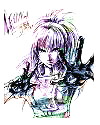of the nature of things-第4部分
按键盘上方向键 ← 或 → 可快速上下翻页,按键盘上的 Enter 键可回到本书目录页,按键盘上方向键 ↑ 可回到本页顶部!
————未阅读完?加入书签已便下次继续阅读!
The nature; habits; motions; ways of life;
Of their progenitors。
And then again;
Since there is ever an extreme bounding point
。 。 。 。 。 。
Of that first body which our senses now
Cannot perceive: That bounding point indeed
Exists without all parts; a minimum
Of nature; nor was e'er a thing apart;
As of itself;… nor shall hereafter be;
Since 'tis itself still parcel of another;
A first and single part; whence other parts
And others similar in order lie
In a packed phalanx; filling to the full
The nature of first body: being thus
Not self…existent; they must cleave to that
From which in nowise they can sundered be。
So primal germs have solid singleness;
Which tightly packed and closely joined cohere
By virtue of their minim particles…
No compound by mere union of the same;
But strong in their eternal singleness;
Nature; reserving them as seeds for things;
Permitteth naught of rupture or decrease。
Moreover; were there not a minimum;
The smallest bodies would have infinites;
Since then a half…of…half could still be halved;
With limitless division less and less。
Then what the difference 'twixt the sum and least?
None: for however infinite the sum;
Yet even the smallest would consist the same
Of infinite parts。 But since true reason here
Protests; denying that the mind can think it;
Convinced thou must confess such things there are
As have no parts; the minimums of nature。
And since these are; likewise confess thou must
That primal bodies are solid and eterne。
Again; if Nature; creatress of all things;
Were wont to force all things to be resolved
Unto least parts; then would she not avail
To reproduce from out them anything;
Because whate'er is not endowed with parts
Cannot possess those properties required
Of generative stuff… divers connections;
Weights; blows; encounters; motions; whereby things
Forevermore have being and go on。
CONFUTATION OF OTHER PHILOSOPHERS
And on such grounds it is that those who held
The stuff of things is fire; and out of fire
Alone the cosmic sum is formed; are seen
Mightily from true reason to have lapsed。
Of whom; chief leader to do battle; comes
That Heraclitus; famous for dark speech
Among the silly; not the serious Greeks
Who search for truth。 For dolts are ever prone
That to bewonder and adore which hides
Beneath distorted words; holding that true
Which sweetly tickles in their stupid ears;
Or which is rouged in finely finished phrase。
For how; I ask; can things so varied be;
If formed of fire; single and pure? No whit
'Twould help for fire to be condensed or thinned;
If all the parts of fire did still preserve
But fire's own nature; seen before in gross。
The heat were keener with the parts compressed;
Milder; again; when severed or dispersed…
And more than this thou canst conceive of naught
That from such causes could become; much less
Might earth's variety of things be born
From any fires soever; dense or rare。
This too: if they suppose a void in things;
Then fires can be condensed and still left rare;
But since they see such opposites of thought
Rising against them; and are loath to leave
An unmixed void in things; they fear the steep
And lose the road of truth。 Nor do they see;
That; if from things we take away the void;
All things are then condensed; and out of all
One body made; which has no power to dart
Swiftly from out itself not anything…
As throws the fire its light and warmth around;
Giving thee proof its parts are not compact。
But if perhaps they think; in other wise;
Fires through their combinations can be quenched
And change their substance; very well: behold;
If fire shall spare to do so in no part;
Then heat will perish utterly and all;
And out of nothing would the world be formed。
For change in anything from out its bounds
Means instant death of that which was before;
And thus a somewhat must persist unharmed
Amid the world; lest all return to naught;
And; born from naught; abundance thrive anew。
Now since indeed there are those surest bodies
Which keep their nature evermore the same;
Upon whose going out and coming in
And changed order things their nature change;
And all corporeal substances transformed;
'Tis thine to know those primal bodies; then;
Are not of fire。 For 'twere of no avail
Should some depart and go away; and some
Be added new; and some be changed in order;
If still all kept their nature of old heat:
For whatsoever they created then
Would still in any case be only fire。
The truth; I fancy; this: bodies there are
Whose clashings; motions; order; posture; shapes
Produce the fire and which; by order changed;
Do change the nature of the thing produced;
And are thereafter nothing like to fire
Nor whatso else has power to send its bodies
With impact touching on the senses' touch。
Again; to say that all things are but fire
And no true thing in number of all things
Exists but fire; as this same fellow says;
Seems crazed folly。 For the man himself
Against the senses by the senses fights;
And hews at that through which is all belief;
Through which indeed unto himself is known
The thing he calls the fire。 For; though he thinks
The senses truly can perceive the fire;
He thinks they cannot as regards all else;
Which still are palpably as clear to sense…
To me a thought inept and crazy too。
For whither shall we make appeal? for what
More certain than our senses can there be
Whereby to mark asunder error and truth?
Besides; why rather do away with all;
And wish to allow heat only; then deny
The fire and still allow all else to be?…
Alike the madness either way it seems。
Thus whosoe'er have held the stuff of things
To be but fire; and out of fire the sum;
And whosoever have constituted air
As first beginning of begotten things;
And all whoever have held that of itself
Water alone contrives things; or that earth
Createth all and changes things anew
To divers natures; mightily they seem
A long way to have wandered from the truth。
Add; too; whoever make the primal stuff
Twofold; by joining air to fire; and earth
To water; add who deem that things can grow
Out of the four… fire; earth; and breath; and rain;
As first Empedocles of Acragas;
Whom that three…cornered isle of all the lands
Bore on her coasts; around which flows and flows
In mighty bend and bay the Ionic seas;
Splashing the brine from off their gray…green waves。
Here; billowing onward through the narrow straits;
Swift ocean cuts her boundaries from the shores
Of the Italic mainland。 Here the waste
Charybdis; and here Aetna rumbles threats
To gather anew such furies of its flames
As with its force anew to vomit fires;
Belched from its throat; and skyward bear anew
Its lightnings' flash。 And though for much she seem
The mighty and the wondrous isle to men;
Most rich in all good things; and fortified
With generous strength of heroes; she hath ne'er
Possessed within her aught of more renown;
Nor aught more holy; wonderful; and dear
Than this true man。 Nay; ever so far and pure
The lofty music of his breast divine
Lifts up its voice and tells of glories found;
That scarce he seems of human stock create。
Yet he and those forementioned (known to be
So far beneath him; less than he in all);
Though; as discoverers of much goodly truth;
They gave; as 'twere from out of the heart's own shrine;
Responses holier and soundlier based
Than ever the Pythia pronounced for men
From out the triped and the Delphian laurel;
Have still in matter of first…elements
Made ruin of themselves; and; great men; great
Indeed and heavy there for them the fall:
First; because; banishing the void from things;
They yet assign them motion; and allow
Things soft and loosely textured to exist;
As air; dew; fire; earth; animals; and grains;
Without admixture of void amid their frame。
Next; because; thinking there can be no end
In cutting bodies down to less and less
Nor pause established to their breaking up;
They hold there is no minimum in things;
Albeit we see the boundary point of aught
Is that which to our senses seems its least;
Whereby thou mayst conjecture; that; because
The things thou canst not mark have boundary points;
They surely have their minimums。 Then; too;
Since these philosophers ascribe to things
Soft primal germs; which we behold to be
Of birth and body mortal; thus; throughout;
The sum of things must be returned to naught;
And; born from naught; abundance thrive anew…
Thou seest how far each doctrine stands from truth。
And; next; these bodies are among themselves
In many ways poisons and foes to each;
Wherefore their congress will destroy them quite
Or drive asunder as we see in storms
Rains; winds; and lightnings all asunder fly。
Thus too; if all things are create of four;
And all again dissolved into the four;
How can the four be called the primal germs
Of things; more than all things themselves be thought;
By retroversion; primal germs of them?
For ever alternately are both begot;
With interchange of nature and aspect
From immemorial time。 But if percase
Thou think'st the frame of fire and earth; the air;
The dew of water can in such wise meet
As not by mingling to resign their nature;
From them for thee no world can be create…
No thing of breath; no stock or stalk of tree:
In the wild congress of this varied heap
Each thing its proper nature will display;
And air will palpably be seen mixed up
With earth together; unquenched heat with water。
But primal germs in bringing things to birth
Must have a latent; unseen quality;
Lest some outstanding alien element
Confuse and minish in the thing create
Its proper being。
But these men begin
From heaven; and from its fires; and first they feign
That fire will turn into the winds of air;
Next; that from air the rain begotten is;
And earth created out of rain; and then
That all; reversely; are returned from earth…
The moisture first; then air thereafter heat…
And that these same ne'er cease in interchange;
To go their ways from heaven to earth; from earth
Unto the stars of the aethereal world…
Which in no wise at all the germs can do。
Since an immutable somewhat still must be;
Lest all things



